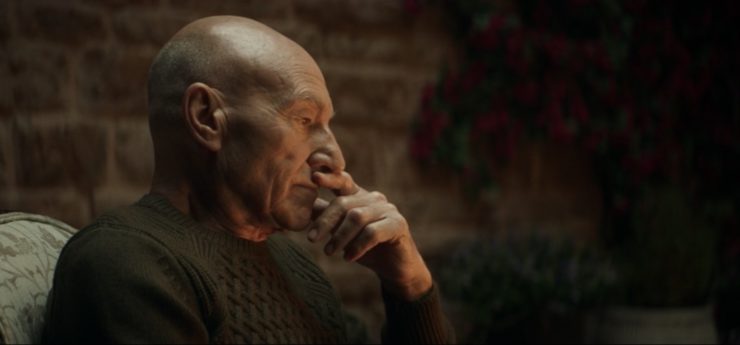In my review of the first-season finale of Picard, I used the famous Anton Chekhov metaphor about how if you hang a gun on the wall early in the story, it should be fired late in the story. While I think that metaphor remains apt, I think an even better one to discuss the first season of Picard as a whole is juggling a lot of hard-boiled eggs.
The show caught most of them, but a few fell to the ground, and a few of those shattered when they hit.
Looking back on the first season, the running themes seem to be how one deals with failure and regret. It’s an interesting approach to take, given that one of the hallmarks of the Jean-Luc Picard character through seven years on television and four feature films is one of spectacular competence. Captain Picard always got it right, always knew what he was doing, always was able to overcome whatever hardships were in his way, using his wits, his intelligence, and his crew, who always had his back.
Buy the Book
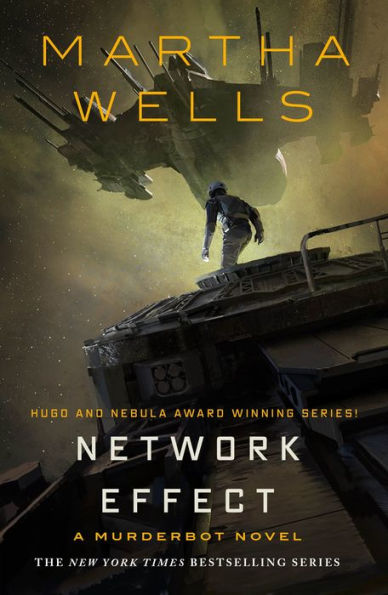

Network Effect
There were exceptions, of course. The Borg captured and suborned him in “The Best of Both Worlds” two-parter, and that put a pretty big chink in his armor, particularly in “I, Borg” and First Contact. Gul Madred tortured him and came within a hairsbreadth of breaking him in “Chain of Command, Part II.”
But otherwise, Picard has always succeeded.
Yet everything we see in Picard is the artifact of his own failures. When Romulus’s sun went nova, he left the Enterprise, and accepted the promotion to admiral that Jim Kirk told him never to accept, in order to lead a huge rescue armada. But then Mars was all but destroyed, seemingly by rogue synths, costing Starfleet its shipyard and leading the Federation to ban synths and cancel Picard’s rescue operation.
Picard then insists that they not cancel the rescue, as too much is at stake. And he’s right—Starfleet is supposed to be in the business of helping people. When Praxis went blooey a hundred years earlier, Starfleet helped the Klingons, and they become a strong ally.
But Starfleet stands its ground, Picard threatens to resign if they don’t reconsider—
—and they call his bluff.
Suddenly, the Jean-Luc Picard who figured out the truth about Ira Graves before everyone else did, who was able to get the Acamarians to consider reuniting, who served as a Klingon Arbiter of Succession, who outsmarted a Romulan plot to discredit an admiral and start a war, who exposed a Cardassian plot to wipe out a Bajoran terrorist, who exposed an admiral’s plot to displace the Bak’u—found himself on the losing side.
Starfleet didn’t need him anymore, so he quit, and sulked like Achilles in his tent. Left without his commission, he returned to the home he rejected as a boy, and took over the family winery.
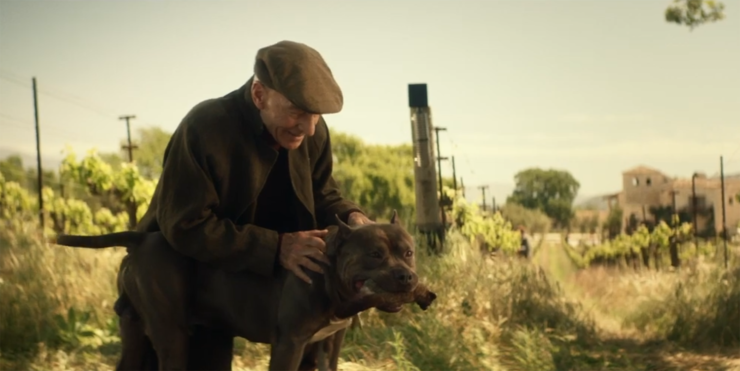
For fourteen years. He abandoned his aide and best friend, Rafi Musiker. He abandoned the Romulans. He retreated and took himself out of the world that had rejected his notions of right and wrong.
It’s the (literal) age-old battle. The one fight you will always lose is against time. Your mind slows down, your body slows down, you become less effective, less canny. You become more set in your ways.
Dramatic heroic fiction—which Star Trek has always been—tends to show its regular characters in their primes. Even the older or younger characters are close to their primes, doing their best work and being their best selves—because if they weren’t, we wouldn’t want to watch a TV show about them.
Less common is to see such characters—such heroes—past their prime. When Picard was first publicly announced, the thing about it that most interested me was seeing a hero who was in the twilight of his life (the character of Picard is 94 years old in the present-day of the series). This sort of thing is more commonly seen in movies (two particularly strong examples are Unforgiven, a script Clint Eastwood held onto for years until he was old enough to play the lead, and another Sir Patrick Stewart vehicle, Logan), but is less commonly seen on television. (Though one great example is the British show New Tricks, about retired detectives who help solve cold cases.)
This entire season is about Picard getting back to himself, becoming once again the person he’s meant to be: the hero. He’s The Captain, he’s the one who solves problems and fixes things. And along the way he has to make up for all the things he’s fucked up.
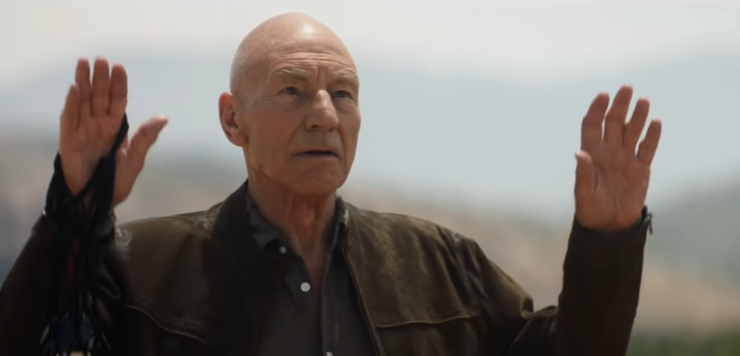
One of those things is something that isn’t so much fixing a thing as it is addressing his own unresolved guilt. Picard has spent the twenty years since we last saw him mourning the death of Data, a dear friend and comrade who should have outlived the senior staff on the Enterprise by centuries instead of predeceasing them. He sacrificed himself to save Picard from his evil twin Skippy, and when given an opportunity to do something for Data’s virtual daughters, he jumps at it.
Hanging over all this is the knowledge that Picard’s on borrowed time anyhow. On the final episode of TNG it was revealed that he had a brain issue that could turn into any number of illnesses, including Irumodic Syndrome (basically, Space Alzheimer’s). His old doctor from the Stargazer reminds him of that, and it finally comes to a head in the finale.
One wonders if the show hadn’t been renewed for a second season if the ending of “Et in Arcadia Ego, Part 2” would have been different, with Picard actually dying alongside Data. It would’ve been a fitting ending, especially since, after all that, he saves the day again. And does it while making a speech.
Along the way, he gets to expiate a few more demons. He reunites with Musiker and with Elnor, and both of them eventually come around to forgiving his shitty behavior toward them. Which he probably doesn’t deserve, but in both cases, coming back into their lives gives them a purpose they didn’t have before he returned. Musiker gets to be useful again, and do what she does best, while Elnor gets a lost cause to fight for (in fact, he gets a couple).
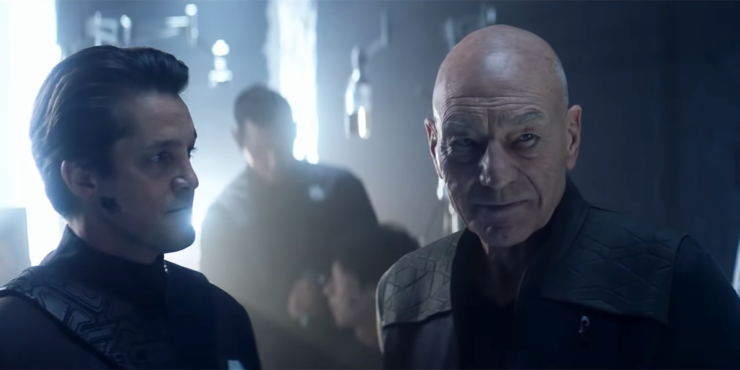
And Picard gets to reunite with Hugh and bond with Seven of Nine, and best of all Picard gets to see that the former Borg drones are being helped.
(Later they get massacred, but that was going to happen regardless, as Narek and Narissa being on the Cube meant that the xB’s were likely to get shot at sooner or later.)
One of the things I particularly enjoyed about this season is that this is the first Star Trek season that feels like it takes place in a galaxy where people live. It’s partly a function of it being the only series not to take place on a military installation of some kind—aside from DS9 all the others take place completely on starships, and DS9 takes place on what used to be a Cardassian station. But the waning days of the 24th century look lived-in. A lot of the thanks likely goes to director Hanelle M. Culpepper, who directed the first three episodes of the season. The visual feel she established is a perfect mix of old and new, with Star Trek’s trademark nostalgia for old things mixed with high-tech accoutrements. It feels like a happy future that acknowledges the past while still willing to move forward.
There were a lot of themes in this inaugural go-round, and they didn’t all resolve as well as one could hope. The biggest, and most important—as evidenced by what we saw in the very first scene and one of the last—is to give Data the exit that Nemesis utterly failed to give him. The final TNG movie is a disaster on several levels, and one of the many sins the film commits is cutting an important line of dialogue that sets up Data’s later sacrifice—a line that Data repeats in his final scene with Picard in the finale. That final scene in the quantum realm also allows Picard to accept Data’s death in a way that he obviously hadn’t up until then.
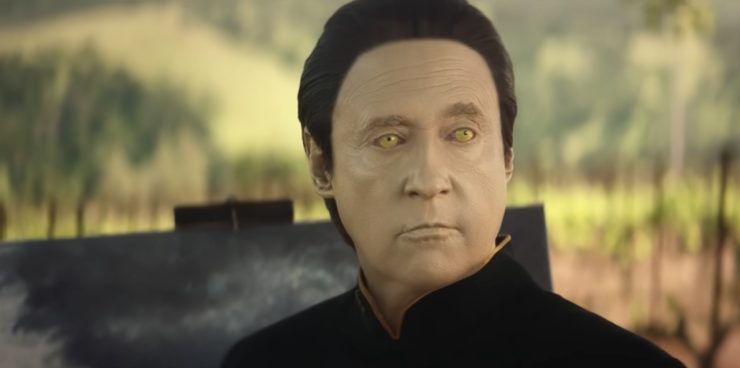
It’s a good thing there’s a second season, though, because there’s a great deal still to be resolved here. Is Agnes Jurati going to face justice for her cold-blooded murder of Bruce Maddox? (No, I’m not letting that go. And no, she wasn’t brainwashed, she was very obviously in control of her actions.) Even if she is found not guilty because of the influence of the Admonition, that isn’t for her or Picard to decide. What will happen to the xB’s? What will happen to the synths? What is the super synth overlord creature that looks like Dr. Octopus’s arms crossed with Cthulhu? Are Musiker and Seven a couple now, or what?
The biggest failure of this season is—after having it be part of the texture and driving the plot—the synth ban is reversed in an off-hand line of dialogue. That’s—um, inadequate, to say the least. So is the fact that the head of Starfleet Security has been revealed as a deep-cover Romulan spy, which is a major security breach. There’s a lot that needs to be addressed regarding Starfleet Command.
However, the show also has given us a lot of avenues to explore—whether in season two or other spinoffs or tie-in fiction or whatever. Seven of Nine and the Fenris Rangers. Kestra. Captain Riker on the Zheng He (okay, that was temporary, but still…). Kestra. Who’s in charge of the Enterprise now? (It should be Worf, as indicated in the Picard tie-in novel Last Best Hope.) Kestra. Stardust City. Kestra. Coppelius. Kestra. The Qowat Milat. Kestra. Other adventures of La Sirena both before and after this season. Kestra. Zhaban and Laris. Kestra. Also, Kestra.
The show has also explored Romulan culture more than any of its predecessors, which is a welcome change. While both Klingons and Romulans were introduced as the major adversaries to the Federation in the first season of the original series, the Klingons have gotten a lot more screen time and a lot more development. Since Picard used the one post-Nemesis event from the mainline universe we’d seen prior to this—the Romulan supernova from the 2009 Star Trek—it opened up the possibilities, and they’ve taken great advantage, adding texture and mythology and storytelling and factions to Romulan life that has beautifully expanded our understanding of the Vulcan offshoots. (They also used a naming convention for the Romulans established by Diane Duane in her brilliant novel My Enemy, My Ally.)
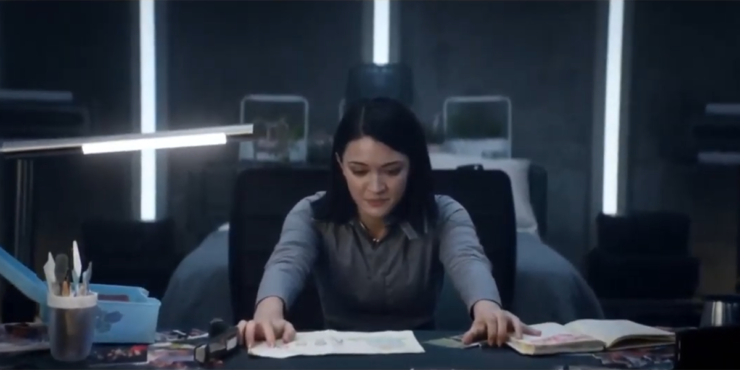
The best thing about the show, though, is the acting. Michelle Hurd, a great character actor often stuck in mediocre parts, has the role of a lifetime here as the complex, addictive-personality, brilliant, fucked-up Musiker. While I have serious problems with how she was written at times, Allison Pill is nothing short of superb as the tormented Jurati. Santiago Cabrera is delightful in the multiple roles of the more-complex-than-he-lets-on Rios as well as his five hilarious holograms. Tamlyn Tomita projects determined strength, showing both the Romulan and Vulcan sides of Oh. Ann Magnuson is a joy as the foul-mouthed Admiral Clancy. Jeri Ryan and Jonathan del Arco show the chaos of transitioning from Borg to human as Seven of Nine and Hugh, respectively, though in both cases I want to know more (and in the latter case, I’m kinda pissed that they killed him off). Necar Zadegan delightfully chews all the scenery as the unapologetically evil Bjayzl. Jamie McShane and Orla Brady are simply brilliant—and woefully underutilized, as we needed to see them again after episode three—as Zhaban and Laris. Jonathan Frakes and Marina Sirtis are spectacular returning to their iconic roles of Riker and Troi (the former having the crowning moment of awesome in the finale, the latter having arguably her best scene as a space shrink in the history of the franchise when she smacks Picard upside the head in “Nepenthe“), while Lulu Wilson steals the entire season with her magnificent work as their daughter Kestra. Also, David Paymer, Rebecca Wisocky, and Evan Parke are excellent in brief roles as Picard’s old doctor, an insane Romulan, and a (justifiably) pissed-off Romulan, respectively.
Not everyone is at that level, sadly. Brent Spiner also returns to an iconic role, and also plays a new one. Both, though, are just feeble excuses to use Spiner again, but the uses of Data are self-indulgent and visually painful to look at—CGI and makeup can only do so much—while Altan Inigo Soong doesn’t really add anything to the proceedings. Isa Briones gets better as the season goes on—her confused post-activation Soji is her best work—but it’s a flatter performance than it should be. Evan Evagora is fine as Elnor, though Ian Nunney is way better as the younger version, but the character himself has precious little to actually do, so it’s really hard to judge him. And the less said about Harry Treadaway’s don’t-hate-me-because-I’m-beautiful Narek and Peyton List’s tiresome Narissa the better.
Oh, and that Stewart fella can act a little, too…
What’s best about Picard, though, is that it’s doing something that Star Trek hasn’t done in two decades, and that’s move forward. After Voyager ended in 2001 and Nemesis was released in 2002, all the new Trek (two TV series, three movies) has looked backward. Going back over the franchise’s fictional history has been the equivalent of navel-gazing, and while it has produced some strong material (the fourth season of Enterprise, the second season of Discovery, Star Trek Beyond), it’s mostly been wheel-spinning. The reason why there was excitement about the new Trek that came out from 1979-2002 was because the adventure was continuing. Kirk and the gang after the five-year mission, a new Enterprise a century after Kirk and the gang, a new station on the frontier, a ship lost in another quadrant, but all of it building on what came before.
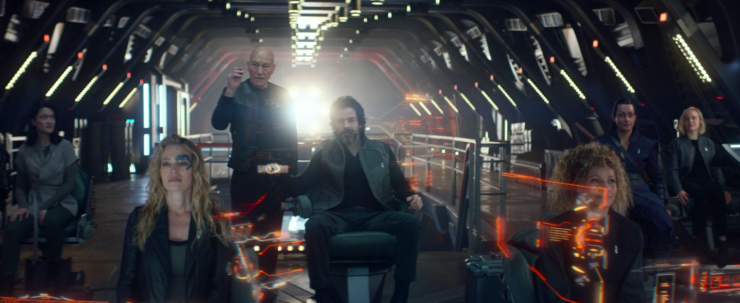
Then came Enterprise and the Bad Robot movies and Discovery and it was all going over old ground. Now, though, Picard is finally taking us in the right direction, finally looking back in on the universe as its progressed instead of backsliding, finally telling frontstory instead of filling in backstory.
Can’t wait for season two…
Keith R.A. DeCandido was going to be a guest at HELIOsphere this weekend, but it—like every other convention this spring—has been cancelled. However, there will be a virtual con, “Beyond the Corona,” and Keith and Laura Antoniou will be hosting a discussion of Deep Space Nine on Sunday at 1pm. Check it out!










